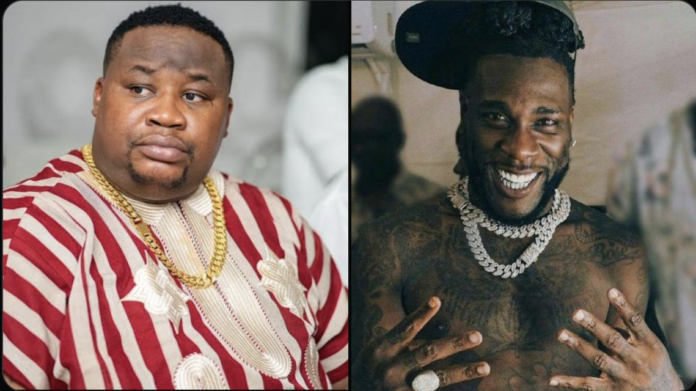Nigerian Afrobeat superstar Burna Boy has found himself in hot water following accusations of ethnic insensitivity during a heated online feud with nightlife entrepreneur and social media influencer, Cubana Chief Priest. The Human Rights Writers Association of Nigeria (HURIWA) has condemned Burna Boy’s comments, urging him to steer clear of ethnic stereotyping in personal disputes.
The drama began when Burna Boy, in a post widely shared on social media, referred to Cubana Chief Priest as “Owerri Rick Ross.” The remark, seen by many as dismissive, quickly drew a fiery response from Cubana Chief Priest, who accused the music icon of owing substantial sums for jewelry. As the exchange escalated, Burna Boy allegedly made comments implying negative stereotypes about the Igbo ethnic group, sparking outrage among fans and cultural advocates.
HURIWA’s Intervention
HURIWA, a prominent human rights organization, has since issued a statement rebuking Burna Boy’s comments. Speaking on Sunday, the association’s National Coordinator, Comrade Emmanuel Onwubiko, described the remarks as “reckless and divisive.”
“Dragging the Igbo identity into a personal disagreement is not only unwarranted but dangerously divisive. It reflects a troubling manifestation of Igbo phobia, which we must collectively condemn,” Onwubiko said.
HURIWA emphasized that Nigeria’s diversity should be celebrated, not weaponized. The group also reminded Burna Boy of his global influence and the responsibility that comes with being a cultural ambassador.
“As an internationally acclaimed artist, Burna Boy embodies the spirit of Nigeria’s rich cultural heritage. His actions and words hold the power to shape perceptions, both locally and internationally. It is imperative that he avoids language that could alienate or offend any ethnic group,” the statement continued.
Calls for Apology
HURIWA has called on Burna Boy to retract his comments and issue a public apology to the Igbo community, asserting that such an apology would demonstrate maturity and a commitment to unity.
“Nigeria faces enough challenges as it is. Adding ethnic tensions to the mix only serves to distract from the critical issues we must address as a nation. Burna Boy’s words carry weight, and we expect him to use his platform to promote peace, not division,” Onwubiko stated.
The association also warned against a growing trend of tribal insinuations in public disputes, particularly among influential figures. According to HURIWA, such behavior risks exacerbating distrust among Nigeria’s numerous ethnic groups.
A Broader Issue
Beyond addressing Burna Boy, HURIWA extended its message to Cubana Chief Priest, urging both parties to engage in respectful and constructive dialogue.
“Public disputes of this nature should not devolve into ethnic attacks. Both Burna Boy and Cubana Chief Priest are influential personalities whose actions serve as models for millions. They have a duty to promote respect and understanding,” Onwubiko added.
Celebrity Culture and Ethnic Sensitivity
This incident sheds light on a larger issue: the responsibility of celebrities and public figures to navigate their influence carefully. Social media, while a powerful tool for connection, has increasingly become a battleground where personal disputes are magnified.
HURIWA’s statement highlighted the dangers of careless remarks, particularly in a nation as ethnically diverse as Nigeria. “Nigeria’s strength lies in its diversity. Public figures must avoid actions or words that could weaken the fragile bonds that hold us together,” the group emphasized.
A Pattern of Tribal Divisions
The controversy surrounding Burna Boy is not the first time ethnic sentiments have sparked public outrage in Nigeria. Tribalism remains a sensitive topic, with deep historical and political implications. Recent years have seen several high-profile cases where tribal slurs and stereotypes fueled national debates, underscoring the urgent need for caution in public discourse.
As a Grammy-winning artist and one of Nigeria’s most recognized cultural exports, Burna Boy has often courted controversy. While his artistry has earned him global accolades, his outspoken nature has sometimes landed him in trouble.
Public Reactions
The online feud has drawn mixed reactions from the public. While some fans defended Burna Boy’s comments as harmless banter, others criticized him for being insensitive. Social media platforms have been flooded with hashtags and debates, with many calling for both parties to resolve their issues privately.
“I love Burna Boy’s music, but this time he went too far,” said a Twitter user. “We need to stop using tribalism as a weapon in arguments. It’s 2025, not 1960!”
Another user wrote: “Cubana Chief Priest isn’t innocent either. Both of them should grow up and stop embarrassing Nigeria on the global stage.”
HURIWA’s Broader Appeal
Concluding its statement, HURIWA appealed to Nigerian artists and influencers to prioritize unity in their public engagements. The association urged them to channel their influence toward addressing pressing issues such as poverty, insecurity, and education rather than fueling divisions.
“Nigeria needs all hands on deck to tackle its challenges. Public figures must unite to inspire hope and progress, not division. We remain committed to holding them accountable,” Onwubiko said.

